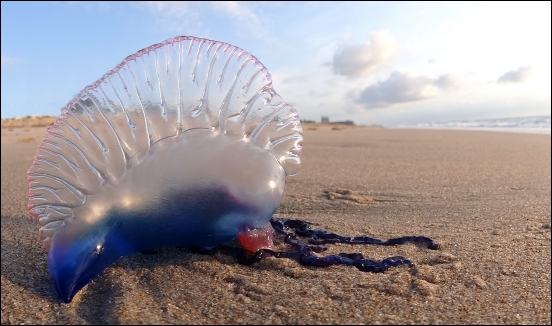Burnham-On-Sea, Berrow and Brean beach users have this week been warned to look out for Portuguese Man O’War being washed up.
Beachgoers have been urged by The Marine Conservation Society (MCS) not to touch the stinging jellyfish-like creatures if they find them.
It comes after the charity has received several reports in the last week of Portuguese Man O’War washing up on beaches in the south west, including in the Bristol Channel.
Dr Peter Richardson, MCS Head of Ocean Recovery, told Burnham-On-Sea.com: “Portuguese Man O’War are ocean-going animals, propelled by the wind on their inflatable sail as they fish the depths with their stinging tentacles. Recent persistent winds have blown them from the Atlantic onto our shores.”
“The stings can be unbelievably painful and in rare cases, fatal. We’d like people to report any sightings of Portuguese Man O’War to us so we get a better idea of the extent of the strandings.”
Portuguese Man O’War are only occasionally reported in UK waters, but this is the second consecutive year they have turned up in numbers.
Last year they were spotted in September on beaches in the South West UK, with significant strandings of the species also reported in in 2009 and 2012.
“The Portuguese Man O’War isn’t a jellyfish but is closely related, and consists of a floating colony of hydrozoans – several tiny marine organisms living together and behaving collectively as if one animal,” he added.
“A purple float, shaped a little like a Cornish pasty, is visible on the water’s surface whilst blue, tentacle-like ‘fishing polyps’ hang below; these can be tens of metres in length.”
“It’s the tentacle-like polyps that can give an agonising and potentially lethal sting.”
“Because a stranded Portuguese Man O’War looks a bit like a deflating purple balloon with blue ribbons attached, children will find it fascinating. So, if you’re visiting local beaches in the next few weeks it’s well worth making sure you know what these animals look like and that no one picks them up.”
If you spot a Portuguese Man O’War then report the sighting immediately, with a picture, to us at Burnham-On-Sea.com and also at www.mcsuk.org.







